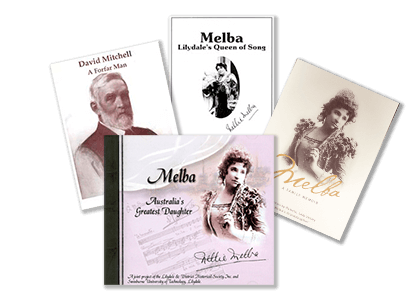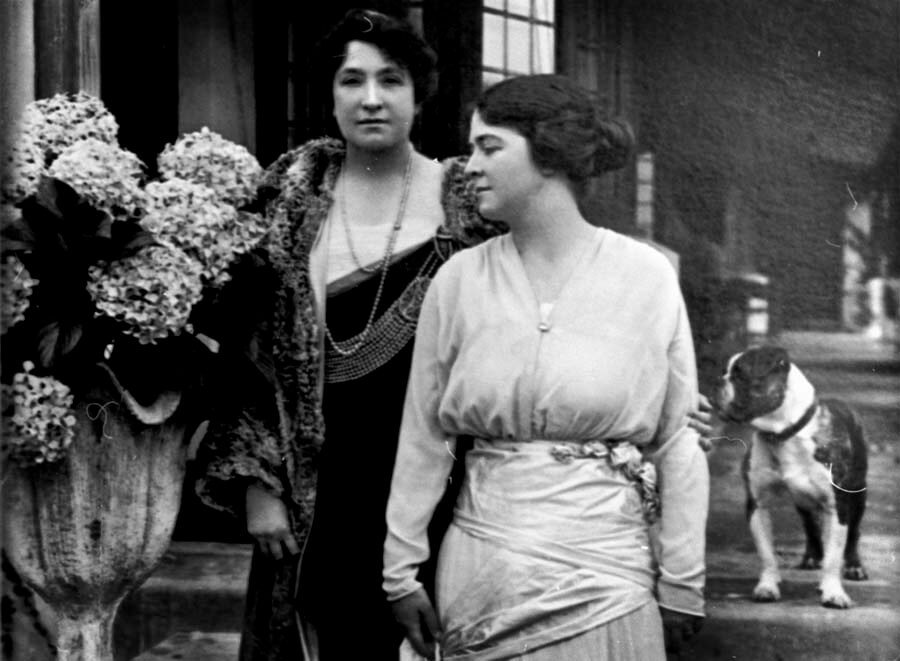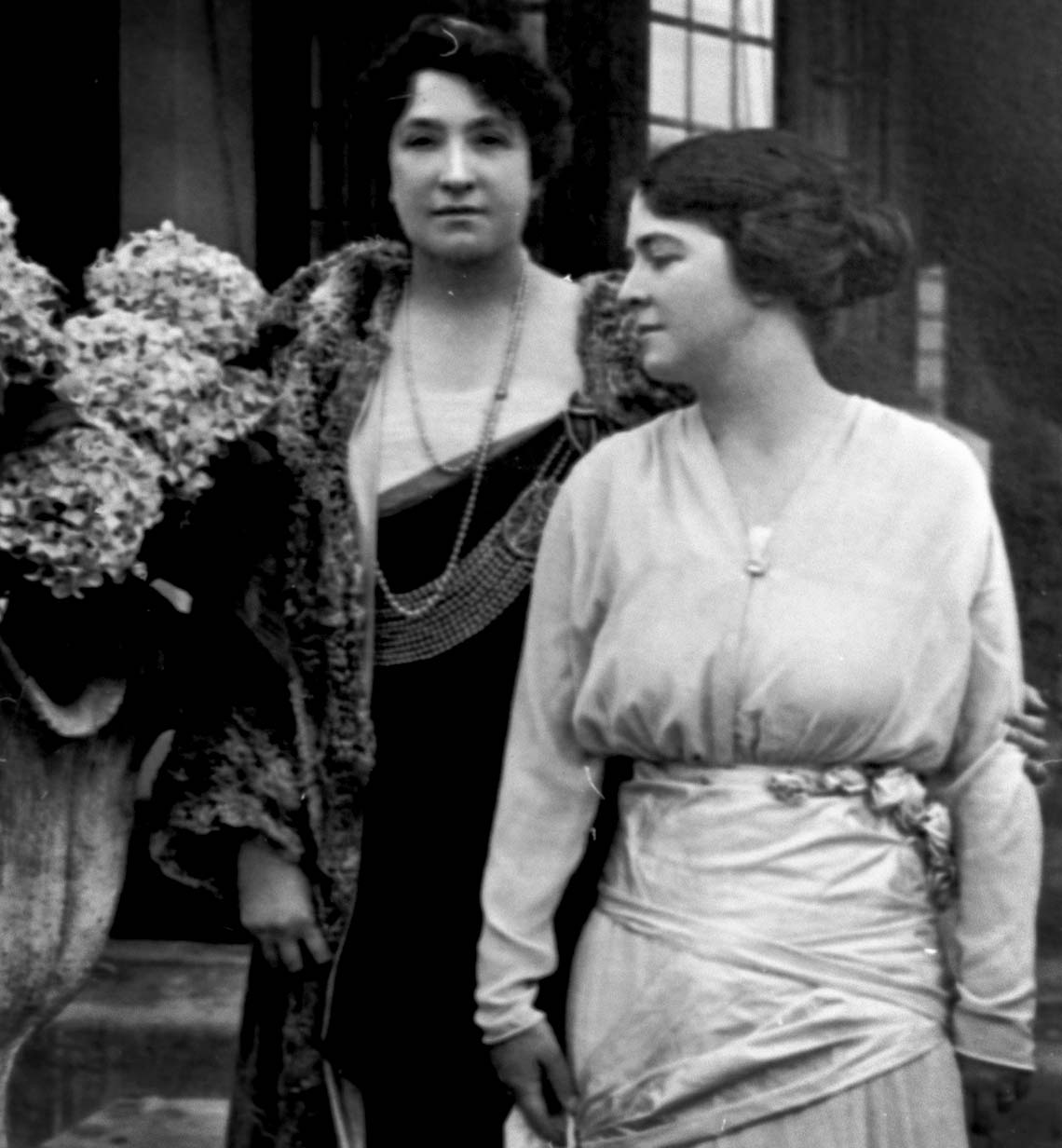
Biography | Melba Conquers Europe
Back in Paris after the successful 1889 season, Melba and George settled into a rented apartment in the Champs Elysées.
Melba had won the audiences of Brussels, Paris and London; she now had a contract with the Paris Opera that included a clause releasing her for the Covent Garden season. She could also seek release to perform at other opera houses in Europe. While her professional life was settled, her personal life was in a turmoil and about to get worse.
Charles was settled on his farm and their marriage was all but over. He also wanted George to stay with him so he could be brought up an Englishman not a boy speaking French and English.
Melba wanted George with her but finally in early 1890 agreed for him to go to school in England and spend the holidays with her at her home in Paris.
Duc d’Orleans
Another problem was also worrying Charles.
During the 1889 season at Covent Garden one of Melba’s admirers was Philippe the Duc d’Orleans. He had seen one of Melba’s performances of Romeo et Juliette, became enraptured and attended every one of her performances at Covent Garden.
Philippe was the son of the Comte de Paris the pretender to the throne of France. The Comte had been exiled from France and in 1885 the family was given sanctuary in England. The Duc was accepted as a cadet at the Royal Military Academy, Sandhurst. He returned to France and demanded to do military service there but was imprisoned for four years for breaching the terms of his exile.
He was sent back to England, as the authorities feared his popularity would create problems.
Pamela Vestey puts the affair into its historical context:
“He was a romantic figure and Nellie was flattered by his adulation. They were indiscreet and were seen together at restaurants and at the theatre. Indiscretion was unforgivable at the time and they were to pay dearly for it. It was a youthful infatuation. He was eight years younger than she and at no time did either of them contemplate a permanent relationship.” (1)

During the Paris season Melba sang Marguerite in Faust and Ophelia in Hamlet and was again a great success. In recognition of her talent, Melba received her first silver medal from the Paris Conservatoire.
Early in 1890 Melba made her first appearance at Monte Carlo giving four performances.
Afterwards George and Melba returned to England and she took George to Sussex so he could attend the small Littlehampton School.

Melba returned to Covent Garden and opened her 1890 season with Romeo et Juliette on June 3.
The Times‘ critic praised her performance:
“Nothing finer is to be seen on the operatic stage than the impersonation of lovers by M. Jean de Reszke and Mme. Melba. So complete a union of vocal and dramatic power as exists in both artists is granted to few singers, and it may be imagined that the three beautiful duets which form the chief points of interest in the two parts were perfectly sung. Mme Melba’s singing of the valse was at first sufficiently fine, but it has been much improved by being taken in a higher key than on the occasion of her first singing the part in England. It is now sung one tone below the original key of G, and much of the brilliancy intended by the composer is therefore retained. The potion scene was perhaps the most successful point of the lady’s impersonation.” (2)
Again The Times spoke glowingly about Melba in Lohengrin:
“The performance of Lohengrin on Tuesday night served to introduce Mme. Melba in a new part, and one in which she may rely on attaining a decided success. A very natural nervousness impaired her earlier scenes, and it was not until the great duet of the last act that she seemed thoroughly to throw herself into the part. Here she sang in very fine style, although much of the music, including her last utterance, lies rather too low for her voice; and here, too, were at least traces of that passionate emotion which give to her Juliet its peculiar charm. Both in the first and second acts her interpretation lacked warmth, though it was of course graceful and to a certain extent sympathetic. If she cannot be regarded at present as an ideal Elsa, her performance shows that she may claim to be a more than capable exponent of the part.”(3)
Royal performances
There were also numerous social functions including appearances at royal functions.
On June 25, Melba sang ‘Air de la Clochette’ from Lakmé as part of musical program of a State Concert held at the command of the Queen at Buckingham Palace. Other artists included Albani, Edouard de Reske, and Jean Lassalle. (4)
This was followed shortly afterwards with a private command performance with Queen Victoria and her daughter Empress Frederick of Germany at Windsor Castle.
The performance was on July 4, 1890, and included Jean and Edouard de Reszke and Jean Lassalle with Mancinelli as the accompanist.
Before the Queen and Empress Frederick, Melba sang ‘Caro Nomeá’ and the waltz song from Romeo et Juliette. There was a duet from La Traviata with Jean de Reszke who also sang the Preislied. The whole of the last act of Faust was also performed. (5)
The performance was full of drama as Melba had to perform Rigoletto that evening at Covent Garden. They were scheduled to perform for the Queen at 4pm but the Empress had gone out for a drive and was running late.
At 4.30pm they were ushered in to meet Queen Victoria. Melba described the meeting:
“As we entered the room a tiny figure in black, attended by her ladies in waiting, took a step towards us. I realized that this was Queen Victoria and that in this frame dwelt the spirit that for over half a century, through storm and stress, had dominated the hearts of countless million subjects. She shook hands with us one by one, looking us straight in the eyes as she did so. I had a dim sense of a picture come to life, so like was she to her portraits – the smooth silver hair, the heavy eyelids.”(6)
After asking the singers questions, it was nearly 4.45pm so the Queen decided the singers could start. At 5.30pm the Empress arrived and the artists had to do the performance all over again. They luckily caught a train just leaving Windsor and arrived in London. Melba did not have time to eat as she arrived at Covent Garden with the first act underway:
“I ran to my room dressed feverishly, dabbed some make-up on my face, and positively ran on the stage. I had delayed them only fifteen minutes, which all things considered, was not bad. But it was a very hungry Gilda who was singing to the great audience that night!” (7)
New opera roles
Melba continued study and to perform new works.
On July 12, 1890 Goring Thomas’ Esmeralda was given in French for the first time and on July 21 Melba made her first London appearance in the French version of Hamlet. (8)
On July 25 the de Reszke brothers, Jean Lassalle and Melba sang for the Prince and Princess of Wales and the Princesses Victoria and Maud at Marlborough House. (9)
Home at Paris
At the end of the Covent Garden season, Melba returned to Paris to the Rue Prony which became her chief pied à terre and “Everything seemed couleur de rose.” (10)
“I had been so much of a wanderer in the last two years that I was indeed happy to have a place that I could call home, and to have friends who would be more than mere acquaintances.” (11)
Already the time ahead was to be busy and Melba was sought to perform in the other opera houses of Europe – Russia, Holland, Germany, Italy to but name a few.
Before the end of 1890, Melba made her only appearance at the Opéra Comique Paris (Théàtre des Nations) to raise funds for a statue in memory of the composer Bizet. It was a matinee performance of Carmen held on December 11 in which Melba sang the minor role of Micaela while Madame Gall-Maria sang the title role. The matinee raised 42,000 francs for the project. (12)
During the year, Melba received an imperial summons from Czar Alexander wanting her to appear at the Imperial Opera, St Petersburg. This was a unique honour and as the visit was to be in February 1891, it gave Melba something to look forward to in the new year. (13)
References
(1) P. Vestey, Melba: A Family Memoir, Pamela Vestey, Coldstream, Melbourne 2000, pg 64.
(2) The Times, June 4 1890 pg 8.
(3) The Times, June 12, 1890 pg 11.
(4) The Times, June 26, 1890, pg 10.
(5) A. Murphy, Melba: A Biography, Doubleday, Page & Co, New York, 1909, pg 54-55.
(6) N. Melba, Melodies and Memories, Thornton Butterworth Ltd, London, 1925, pg 79.
(7) N. Melba, op. cit. pg 81.
(8) A. Murphy, op. cit., pg 56 and 57.
(9) The Times, July 26, 1890 pg 11.
(10) N. Melba, op. cit. pg 87.
(11) N. Melba, op. cit, pg 82.
(12) A. Murphy, op. cit., pg 59.
Online Shop
Purchase books, CDs, photographs and other merchandise



Share Your Information with the Museum!
Email us your info (and images) to:
[email protected]
Our home is the Old Lilydale Court House:
61 Castella Street, Lilydale 3140
Hours of opening:
By appointment only:
Fridays 1 to 4pm and Saturdays to Mondays 11am to 4pm.
Sundays are preferred.
Closed Public Holidays

Nellie Melba Museum
Contact Details:
Sue Thompson: 0475 219 884
Email: [email protected]
Share your info with us:
[email protected]
Our home is the Old Lilydale Court House:
61 Castella Street, Lilydale 3140
Hours of opening:
By Appointment only:
Fridays 1 to 4pm and Saturdays to Mondays 11am to 4pm.
Sundays are preferred.
Closed Public Holidays

Nellie Melba Museum
Contact Details:
Sue Thompson: 0475 219 884
[email protected]
Nellie Melba Museum
Contact Details:
Sue Thompson: 0475 219 884
[email protected]
Our home is the Old Lilydale Court House:
61 Castella Street, Lilydale 3140
Hours of opening:
By appointment only:
Fridays 1 to 4pm and Saturdays to Mondays 11am to 4pm.
Sundays are preferred.
Closed Public Holidays
Share Your Information
with Nellie Melba Museum!
Sue Thompson: 0475 219 884
[email protected]

